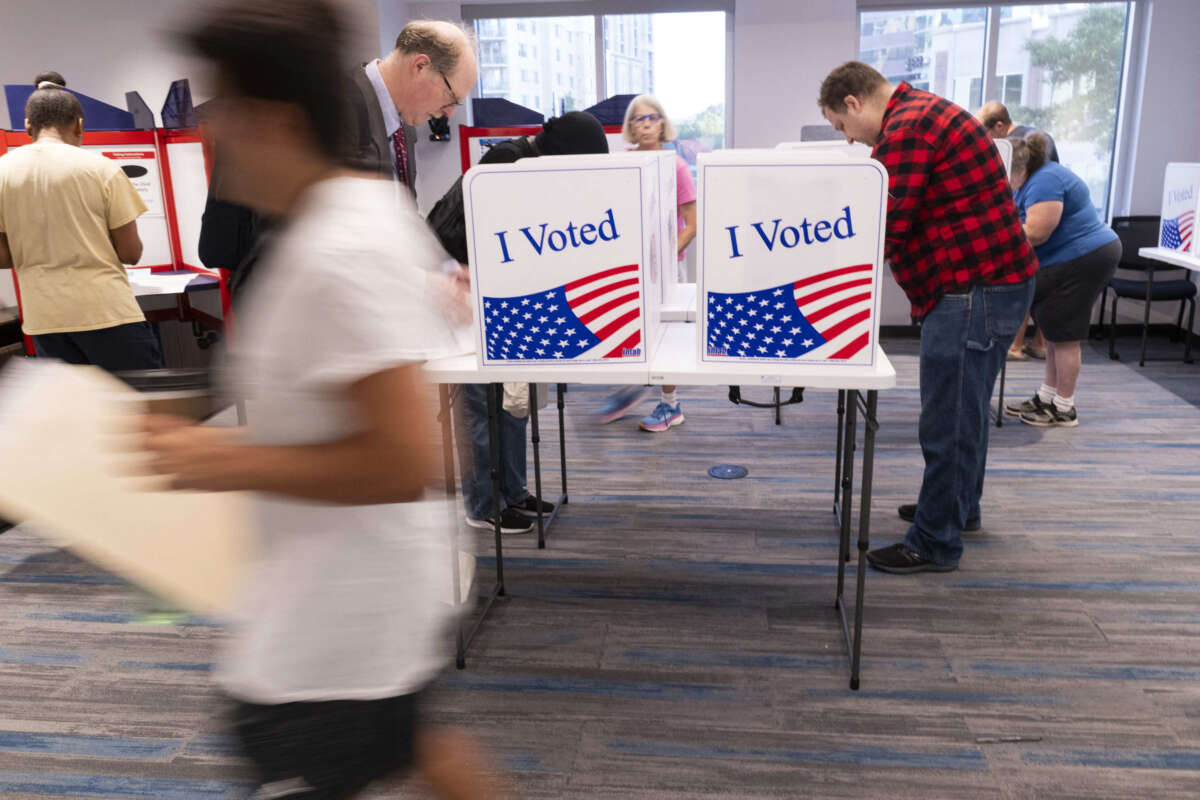A federal appeals court has dismissed a bid by Virginia state officials to overturn a lower court’s injunction on the state’s efforts to purge voters from registration rolls.
Late last week, Virginia-based federal Judge Patricia Giles ruled in favor of several voting rights groups, joined by the Department of Justice (DOJ), who had argued that a purge of voting registrations ordered by Gov. Glenn Youngkin in August was in violation of federal voting rights law, particularly one that forbid any kind of purge within 90 days of an upcoming election.
Virginia had tried to remove people from the voting rolls who had previously indicated on Department of Motor Vehicle forms that they weren’t citizens, or had otherwise left that part of a form blank. In the former’s case, it’s possible that those individuals have since become citizens; in the latter’s, they may be citizens who simply made a mistake by omitting that information.
Indeed, dozens of examples of people who were likely U.S. citizens were revealed within the arguments made by the plaintiffs suing the state, including 18 confirmed citizens who were removed from the voter rolls as a result of the state’s purge.
“How many more are there?” Giles asked rhetorically during a hearing.
The action violated the National Voter Registration Act (NVRA), which requires any removal of voters from voter registration rolls to be “uniform, non-discriminatory, in compliance with the Voting Rights Act and must be completed 90 days before a federal election.”
Soon after, Virginia Republican officials appealed Giles’s ruling to the Fourth Circuit U.S. Court of Appeals. However, a three-judge panel on that court also rejected the state’s arguments over the weekend, agreeing with Giles’s ruling that the state was in violation of the NVRA.
The state was not limited from barring votes from people they discovered to be noncitizens, the federal appeals court found, writing in their opinion that:
Appellants’ claims of irreparable injury absent a stay are weak. Under the preliminary injunction, appellants remain able to prevent noncitizens from voting by canceling registrations on an individualized basis or prosecuting any noncitizen who votes — options the district court specifically flagged at the hearing and in its written order.
Furthermore, the lower court’s ruling was correct by recognizing that “a federal law that functions to prevent last-minute voter registration purges and to ensure that people who are legally entitled to vote are not prevented from doing so by faulty databases or bureaucratic mistakes,” the circuit court wrote.
Virginia Attorney General Jason Miyares is planning to appeal the ruling to the Supreme Court.
Examples abound of how Virginia Republican lawmakers’ actions directly impacted eligible voters within the state.
In one example, 37-year-old Shantae Martin, a resident who was born in the state, was among those removed from the voter registration rolls as a result of Youngkin’s purge. Martin was only aware of the action after an organization called African Communities Together (a co-plaintiff in the case) alerted her that she had been removed from the rolls.
In another example, Carolina Diaz Tavera, a resident of the state who, according to her affidavit, “meet[s] all qualifications to vote” in Fairfax County, was also purged from the rolls. Diaz Tavera emigrated to the U.S. in 2000, became a citizen in 2013 and has been registered to vote since that year. She also only discovered she had been removed from the rolls in October, after attempting to confirm she was registered.
“I was confused about why my registration was not listed and concerned that I may not be able to vote in the election,” she said in a statement.
In a statement lauding the initial lower court ruling, Virginia Coalition for Immigrant Rights (VACIR), another co-plaintiff in the case, said the blocking of Youngkin’s purge was “a major step in defending the right to vote in Virginia.”
“Our vote is our voice, and together we will always defend it,” the organization added.
Our most important fundraising appeal of the year
December is the most critical time of year for Truthout, because our nonprofit news is funded almost entirely by individual donations from readers like you. So before you navigate away, we ask that you take just a second to support Truthout with a tax-deductible donation.
This year is a little different. We are up against a far-reaching, wide-scale attack on press freedom coming from the Trump administration. 2025 was a year of frightening censorship, news industry corporate consolidation, and worsening financial conditions for progressive nonprofits across the board.
We can only resist Trump’s agenda by cultivating a strong base of support. The right-wing mediasphere is funded comfortably by billionaire owners and venture capitalist philanthropists. At Truthout, we have you.
We’ve set an ambitious target for our year-end campaign — a goal of $250,000 to keep up our fight against authoritarianism in 2026. Please take a meaningful action in this fight: make a one-time or monthly donation to Truthout before December 31. If you have the means, please dig deep.
